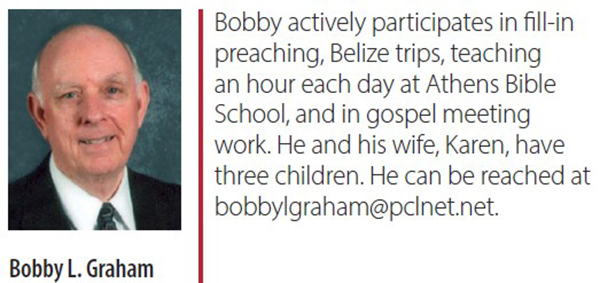QUESTIONS and ANSWERS

Question:
Is It Scriptural to Say that the Church Needs to "Disfellowship" One of Its Members?
Answer:
What is (or is not) scriptural terminology raises a subject needing some examination. The Bible does teach that all need to abide in the teaching of Jesus Christ (2 John 9), proclaim no other gospel (Gal. 1:6-8), not go beyond what is written (1 Cor. 4:6), neither add to nor subtract from the “words of this book” (Rev. 22:18-19), and “speak as the oracles of God” (1 Pet. 4:11). Let there be no doubt that teaching or acting without God’s permission (i.e., without Bible authority) is sinful!
Does a passage like 1 Peter 4:11 (“speak as the oracles of God”) require that we use only the New Testament’s language to express biblical ideas? Is it right ever to articulate a scriptural concept in words not used in the Bible? The demand of this verse deals with what one teaches/speaks so that the speaker might be careful as a good steward (v. 10) only to speak what is from authoritative sources, such as the apostles of the Lord, prophets who spoke by the guidance of the Spirit, or recognized inspired sources. Only when that which is spoken harmonizes with the oracles/utterances of God should it be spoken by disciples even in our day.
Does truth have to be expressed in the exact words of the New Testament? That is the question we now consider. There is no doubt that the words of the New Testament best convey the intended truth. For this reason, we should stay as close to them as possible, “calling Bible things by Bible names.” On the other hand, current English usage might slightly deviate from the New Testament’s exact wording. More recent translations of the Bible, such as the New King James Version and the New American Standard Version, vary from the King James Version, often considerably. Nevertheless, they are still counted as reliable translations even in their variations (cf. Matt. 28:19-20; Eph. 5:18; Prov. 20:1; 1 Cor. 5:5; 2 Pet. 1:5ff; and many others). Jesus often quoted Old Testament passages, but He sometimes paraphrased a verse/expressed it in different words while still correctly conveying the original idea (cf. Ps. 40:6 and Heb. 10:5; Micah 7:6 and Matt. 10:35-36; Deut. 6:5 and Matt. 22:37). It is not my purpose (in this answer) to deal with the desirability/dependability of different versions of the Bible, or to account for the changes often present in them (I have accordingly chosen those which would cause less disagreement or opposition among Bible students).
If faithful to the original text’s meaning, such variations and slight changes in expression or wording do not alter truth; they merely present that truth in different words or phrases. If Jesus and able Bible translators did what they did without altering the meaning of verses, could not a teacher of truth today do likewise, as long as he does not alter the meaning? This is what happens in wording such as our querist asked about: “disfellowship” as opposed to “withdraw fellowship.” It is vastly different from paraphrasing Acts 8:38 as “he christened/sprinkled him.” (I was once stoutly questioned and even reprimanded for using “immersed” instead of “baptized” when quoting certain verses.)
In reality, the Bible does not even use the expression “disfellowshipped” or “withdrew fellowship.” None of the Bible translations familiar to me speaks about “withdrawing fellowship.” Paul does urge, “Withdraw yourselves” from certain ones (2 Thess. 3:6). Withdrawing self from disorderly brothers/keeping aloof from them does entail not having a share/part/fellowship with them in certain areas, and this idea may well be found in expressions like “withdraw fellowship” or “disfellowship.” As a personal preference, I like to think and speak of this matter as the Bible does, to “withdraw yourselves.” That does not mean that the other two expressions here examined on this matter are unscriptural in thought, even though they are not used verbatim in the Scriptures.
It occurs to me that all of us speak in ways not stated in the Bible. I will demonstrate: We refer to church organization, the Christian life, the Bible, church discipline, the plate (used for the bread or the contribution), basket (again, used for the collection), vocal music, songbooks, and song/worship leader. If you can find these in the Bible, please send information as to where you found them. Does their use violate the New Testament? No, and for the reasons already discussed. 
by Bobby L. Graham


